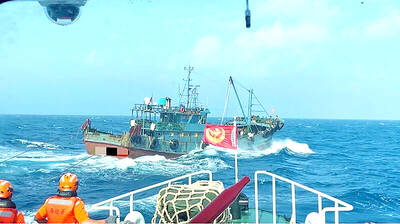US President Donald Trump’s administration is considering whether to add China’s top chipmaker to a trade blacklist, a US Department of Defense official said on Friday, as the US escalates its crackdown on Chinese companies.
A Pentagon spokeswoman said that the department was working with other agencies to determine whether to make the move against Semiconductor Manufacturing International Corp (SMIC, 中芯), which would force US suppliers to seek a difficult-to-obtain license before shipping to the company.
SMIC and the Chinese embassy in Washington did not immediately respond to requests for comment.
Earlier this week, the Pentagon made a proposal to place SMIC on the entity list of the End User Review Committee, a panel led by the US Department of Commerce, which also includes the US departments of State and Energy and makes decisions about entity listings, a person familiar with the matter said.
It was not clear whether the other agencies supported the plan.
The Trump administration has often used the entity list — which now includes more than 275 China-based firms — to hit key Chinese industries, from telecoms equipment giants Huawei Technologies Co (華為) and ZTE Corp (中興) over sanction violations, to surveillance camera maker Hangzhou Hikvision Digital Technology Co (杭州海康威視數字技術) over suppression of China’s Uighur minority.
SMIC is the largest Chinese chip manufacturer, but is second to rival Taiwan Semiconductor Manufacturing Co (TSMC, 台積電), the industry’s market leader. It has sought to build foundries for the manufacture of computer chips that can compete with TSMC.
However, it is also facing new restrictions from the commerce department that require Huawei’s chip manufacturers to seek US licenses before producing chips for the telecoms giant, if they rely on US chipmaking technology.
SMIC is one of Huawei’s manufacturers.
US companies, including Lam Research Corp, KLA Corp and Applied Materials Inc, which supply key chipmaking equipment, could be affected by a potential entity listing, industry sources said.
While the Pentagon official did not outline the reasons for the action, SMIC’s relationship to the Chinese military is under scrutiny, another US official and two former officials briefed on the matter said.
The Trump administration has increasingly trained its focus on Chinese companies that bolster Beijing’s military.
Last month, the US blacklisted 24 Chinese companies and targeted individuals who it said were part of construction and military actions in the South China Sea, its first such sanctions against Beijing over the disputed strategic waterway.
The defense department has released two lists of Chinese companies in the past few months that it says are owned or controlled by the Chinese People’s Liberation Army. The designation gives Trump the authority to place them on an even tougher blacklist, but so far no action has been taken.

MILITARY BOOST: The procurement was planned after Washington recommended that Taiwan increase its stock of air defense missiles, a defense official said yesterday Taiwan is planning to order an additional four PAC-3 MSE systems and up to 500 missiles in response to an increasing number of missile sites on China’s east coast, a defense official said yesterday. The official, who spoke on condition of anonymity, said that the proposed order would be placed using the defense procurement special budget, adding that about NT$1 trillion (US$32,88 billion) has been allocated for the budget. The proposed acquisition would include launchers, missiles, and a lower tier air and missile defense radar system, they said The procurement was planned after the US military recommended that Taiwan increase

POLITICAL AGENDA: Beijing’s cross-strait Mid-Autumn Festival events are part of a ‘cultural united front’ aimed at promoting unification with Taiwan, academics said Local authorities in China have been inviting Taiwanese to participate in cross-strait Mid-Autumn Festival celebrations centered around ideals of “family and nation,” a move Taiwanese academics said politicizes the holiday to promote the idea of “one family” across the Taiwan Strait. Sources said that China’s Fujian Provincial Government is organizing about 20 cross-strait-themed events in cities including Quanzhou, Nanping, Sanming and Zhangzhou. In Zhangzhou, a festival scheduled for Wednesday is to showcase Minnan-language songs and budaixi (布袋戲) glove puppetry to highlight cultural similarities between Taiwan and the region. Elsewhere, Jiangsu Province is hosting more than 10 similar celebrations in Taizhou, Changzhou, Suzhou,

COGNITIVE WARFARE: Chinese fishing boats transmitting fake identification signals are meant to test Taiwan’s responses to different kinds of perceived incursions, a report said Chinese vessels are transmitting fake signals in Taiwan’s waters as a form of cognitive warfare, testing Taipei’s responses to various types of incursions, a report by the Institute for the Study of War said on Friday. Several Chinese fishing vessels transmitted fake automatic identification system (AIS) signals in Taiwan’s waters last month, with one mimicking a Russian warship and another impersonating a Chinese law enforcement vessel, the report said. Citing data from Starboard Maritime Intelligence, the report said that throughout August and last month, the Chinese fishing boat Minshiyu 06718 (閩獅漁06718) sailed through the Taiwan Strait while intermittently transmitting its own AIS

CHINESE INFILTRATION: Medical logistics is a lifeline during wartime and the reported CCP links of a major logistics company present a national security threat, an expert said The government would bolster its security check system to prevent China from infiltrating the nation’s medical cold chain, a national security official said yesterday. The official, who wished to stay anonymous, made the remarks after the Chinese-language magazine Mirror Media (鏡周刊) reported that Pharma Logistics (嘉里醫藥物流) is in charge of the medical logistics of about half of the nation’s major hospitals, including National Taiwan University Hospital and Taipei Veterans General Hospital. The company’s parent, Kerry TJ Logistics Co (嘉里大榮物流), is associated with the National Committee of the Chinese People’s Political Consultative Conference (CPPCC) and the Chinese People’s Liberation Army (PLA), the